|
|
|
Sort Order |
|
|
|
Items / Page
|
|
|
|
|
|
|
| Srl | Item |
| 1 |
ID:
190010


|
|
|
|
|
| Summary/Abstract |
Although Lord Plumer’s tenure as high commissioner for Palestine (1925–28) is sometimes characterized by mainstream Euro-American histories as a period of comparative peace, the year 1927 saw two major disruptions: the Jericho earthquake in July, which caused serious damage to towns and cities including Jerusalem, Nablus, and Lydda; and unrest among Jewish immigrants who found that the local economy had no jobs to offer them—or at least not ones at the European rates of pay to which they were accustomed. This article explores the ways in which each of these crises intersected with Palestine’s infrastructure—in particular its railways, roads, and housing stock. I argue that the disparate ways in which the British administration approached earthquake victims versus the unemployed, the help it offered (or failed to offer), and the policies it implemented are telling about the nature of British governance in Palestine in the mid-1920s and British administrative priorities and concerns. The Mandate authorities’ responses to the quake—characterized by selective negligence—reveal the colonial administration’s weakness, the contested ways in which colonial structures were shaped and operated in the early Mandate period, and the extent to which maintaining a facade before other colonial powers and the League of Nations outweighed substantive action.
|
|
|
|
|
|
|
|
|
|
|
|
|
|
|
|
| 2 |
ID:
094957
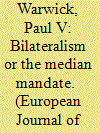

|
|
|
|
|
| Publication |
2010.
|
| Summary/Abstract |
Michael McDonald and Ian Budge have recently advanced an interpretation of democratic governance based on what they term the 'median mandate'. This perspective locates the key element of liberal democracy in a close correspondence between government policy and the policy preferences of the median voter on the left-right scale. The cross-national evidence they produce in favour of this interpretation is impressive, but it largely hinges on a method for measuring the median voter position in each election that relies on the positions of the various parties in the election and the vote shares they received. This article examines the validity of the median mandate hypothesis when median positions are measured more directly from public opinion surveys (particularly, the Eurobarometer and Comparative Study of Electoral Systems series). The findings show that choice between distinct alternatives, rather than conformity to the median, more accurately characterises governance in democratic systems.
|
|
|
|
|
|
|
|
|
|
|
|
|
|
|
|
| 3 |
ID:
108305


|
|
|
|
|
| Publication |
2011.
|
| Summary/Abstract |
The Greek Orthodox Church in Palestine, the largest of the Christian denominations, had long been troubled by a conflict ("controversy") between its all-Greek hierarchy and its Arab laity hinging on Arab demands for a larger role in church affairs. At the beginning of the Mandate, community leaders, reacting to British official and Greek ecclesiastical cooperation with Zionism, formally established an Arab Orthodox movement based on the structures and rhetoric of the Palestinian nationalist movement, effectively fusing the two causes. The movement received widespread (though not total) community support, but by the mid-1940s was largely overtaken by events and did not survive the 1948 war. The controversy, however, continues to negatively impact the community to this day.
|
|
|
|
|
|
|
|
|
|
|
|
|
|
|
|
| 4 |
ID:
168373
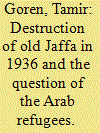

|
|
|
|
|
| Summary/Abstract |
One outcome of the Jewish–Arab conflict at the time of the British Mandate was the Arab refugee problem. It usually accompanied any escalation in hostilities and was evident at foci of the friction between Arabs and Jews. Reprisals by the authorities against the Arab population was an additional cause. At the time of the Arab Revolt the refugee issue assumed for the first time significant proportions as a result of destructive actions by the British army, the greatest being the home demolition operations unleashed in Jaffa. As a result many families became refugees inside and outside their city. For the first time in the Mandate period the British government was obliged to contend with the problem of Arab refugees that it itself had created, and resolve it. The article aims to shed light on a unique operation by the Mandatory government intended to establish a locality to house Arab refugees, which was implemented and completed in the Mandate period. The article shows that for the authorities the establishment of a quarter for refugees was the required and most appropriate solution to the problem that had arisen.
|
|
|
|
|
|
|
|
|
|
|
|
|
|
|
|
| 5 |
ID:
165681
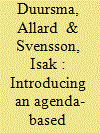

|
|
|
|
|
| Summary/Abstract |
Previous quantitative mediation research has relied on generalized measurements of “mediation success,” such as agreements, ceasefires or peace durability. However, these measurements of success do not take into account what mediators were mandated to achieve. We propose benchmarking outcomes against the explicit mandates of the interventions, a novel way of conceptualizing mediation success. Utilizing data on the agendas of mediated negotiations in intrastate armed conflicts in Africa between 1990 and 2010 as a proxy for mediation mandates, we examine the relative effectiveness of manipulation as a mediation strategy. The study shows, in contrast to previous research, that third party manipulation does not have a significant effect on whether the goal of a given round of negotiations is achieved and, that under some circumstances, may decrease the likelihood of mediation success. We discuss the opportunities as well as limitations of a mandate-based approach to the study of mediation success.
|
|
|
|
|
|
|
|
|
|
|
|
|
|
|
|
| 6 |
ID:
102707
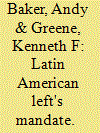

|
|
|
| 7 |
ID:
187770


|
|
|
|
|
| Summary/Abstract |
This article delves into the pre-Nakba literary scene of the 1930s and 1940s by way of its literary periodicals. Following the work of Hanna Abu Hanna and Ishaq Musa al-Husseini, the article posits periodicals as a primary, albeit understudied, site of Palestinian literary production. Prior to the Nakba, the Palestinian literary landscape experienced a small-scale local nahda in the form of adab maqalat (periodical literature) rather than adab mu’allafat (monograph/book-form literature). However, due to the ruptures of 1948, this formative period of adab maqalat has been unexplored and remains disconnected from Palestinian literary histories. In the context of a larger project that reconnects fragmented “black hole” periods of Palestinian literary history, this article takes a step toward sketching the major elements of Palestine’s literary landscape before the Nakba.
|
|
|
|
|
|
|
|
|
|
|
|
|
|
|
|
| 8 |
ID:
103384


|
|
|
|
|
| Publication |
2011.
|
| Summary/Abstract |
Many governments mandate the blending of biofuels with fossil fuel supplies. The paper raises the possibility that some firms might choose not to respect such mandates, and cites the UK's experience, where a buyout of the obligation is possible. A simple economic framework is then used to explore some implications of mandate buyouts, including situations when buyouts and road-fuel-tax rebates are applied together. Finally, it discusses the design of buyout-mandate schemes that could release raw materials from biofuel production, following a future world food price shock.
|
|
|
|
|
|
|
|
|
|
|
|
|
|
|
|
| 9 |
ID:
112066
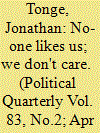

|
|
|
|
|
| Publication |
2012.
|
| Summary/Abstract |
The episodic dissident republican activity evident in Northern Ireland since the Good Friday Agreement has been accompanied by regular assertions from the police, politicians and commentators that dissidents have no backing. This article examines the historic importance of mandates and support for previous and contemporary republican armed campaigns. It explores whether violent republicans have ever enjoyed widespread support in Ireland and assesses the extent to which a lack of backing has precluded violent campaigns. The piece analyses the evidence regarding the lack of sympathy for current dissident violence, assessing the degree to which armed republicanism has reached a new level of isolation.
|
|
|
|
|
|
|
|
|
|
|
|
|
|
|
|
| 10 |
ID:
185037
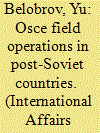

|
|
|
|
|
| Summary/Abstract |
THE CORE tasks of the Organization for Security and Cooperation in Europe (OSCE) include maintaining peace and security in member states and helping them prevent or settle crises or conflicts that may arise in their territory or in their relationships with one another. OSCE field operations in vulnerable member countries are an important tool for the organization to carry out these tasks. Any such operation is naturally conditional on the consent of the host country and requires the approval of all OSCE member states.
|
|
|
|
|
|
|
|
|
|
|
|
|
|
|
|
| 11 |
ID:
172905
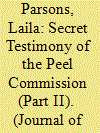

|
|
|
|
|
| Summary/Abstract |
This is the second installment of a two-part article on the recently released secret testimony to the Peel Commission. Part I (JPS 49, no. 1) showed how the secret testimony deepens our understanding of the structural exclusion of the Palestinians from the Mandate state. Part II now focuses on what the secret testimony reveals about the Peel Commission's eventual decision to recommend partition. It turns out that Zionist leaders were less central to this decision than scholars have previously assumed, and that second-tier British colonial officials played a key role in the commissioners' partition recommendation. British decision-making over the partition of Palestine was shaped not only by a broad ambition to put into practice global-imperial theories about representative government and the protection of minorities; it also stemmed from a cold-eyed self-interest in rehabilitating the British reputation for efficient colonial governance—by terminating, in as deliberate a manner as possible, a slack and compromised Mandatory administration.
|
|
|
|
|
|
|
|
|
|
|
|
|
|
|
|
| 12 |
ID:
180043
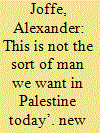

|
|
|
|
|
| Summary/Abstract |
The decision-making process behind the appointment of General Alan Cunningham as High Commissioner of Palestine in November 1945 to replace Field Marshal Lord Gort has been difficult to explain. Cunningham’s record as a failed wartime general and backwater administrative commander were scant preparation for an important political position in Mandatory Palestine. Newly located files indicate Vice Chief of the Imperial Staff Archibald Nye listed Cunningham among a series of possible candidates for consideration by Prime Minister Clement Atlee. Terror attacks in Palestine, American pressure over Jewish refugees, the need to secure additional American loans, and the covert Anglo-French intelligence war in the Middle East, pressured Atlee to make a quick decision. After some confusion Cunningham was selected and Chief of the Imperial General Staff Alan Brooke approved. Haste and personal connections therefore brought about a critical appointment that shaped the end of the Mandate.
|
|
|
|
|
|
|
|
|
|
|
|
|
|
|
|
| 13 |
ID:
165587


|
|
|
|
|
| Summary/Abstract |
Tourist guides to colonised territories are usually understood as instruments of the coloniser, imposing ideas of native inferiority through orientalism and convictions of primitiveness. This article, however, shows how Palestinian Arabs and Zionist Jews in the later period of British Mandate rule used guidebooks, written in English and particularly aimed at a readership of Commonwealth soldiers on leave, as a means of asserting and conveying their rival claims to Palestine to popular Anglophone audiences. In particular, they combined the more conventional coverage of historical and religious sites with insistence on the modernity and technological progress to be found amongst their respective cultures and histories. I understand this as both a tactical usage of the concept of modernity to intervene in image-making about the Middle East, and as a conscious effort by Palestinian Arabs and Jews to insist that modern values, associated in the language of the Mandate and notions of progress, were inherent in their cultures and social practices.
|
|
|
|
|
|
|
|
|
|
|
|
|
|
|
|
| 14 |
ID:
185887
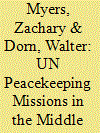

|
|
|
|
|
| Summary/Abstract |
While new ‘multidimensional’ peacekeeping missions emerged at the end of the Cold War, more ‘traditional’ monitoring missions continue to operate. This work reviews the three current peacekeeping missions in the Middle East, with mandates to monitor buffer lines or zones between Israel and its previously warring neighbours: the UN Truce Supervision Organization (UNTSO), the UN Disengagement Observer Force (UNDOF), and the UN Interim Force in Lebanon (UNIFIL). We provide an overview of these three missions, their mandates, the circumstances from which they emerged and evolved. We then consider causal factors that have contributed to their effectiveness over the years and examine how such factors apply in the current state of these missions. Finally, noting that the region evolves and so must the missions, we offer recommendations for how they could remain effective into the future by investing in new technological capabilities and maintaining the integration between their analysis units.
|
|
|
|
|
|
|
|
|
|
|
|
|
|
|
|
| 15 |
ID:
095622
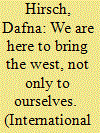

|
|
|
| 16 |
ID:
172376
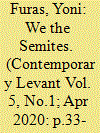

|
|
|
|
|
| Summary/Abstract |
This article reconceptualises ‘Semite’ as a contested chronotope in which Western scientific categories served Palestinian and Zionist educators’ claims to cultural self-determination and national claims over the same space, Palestine. Since the early nineteenth century, racial categories have gained prominence as useful scientific tools to differentiate peoples and cultures. This article analyses how Arabs and Jews adopted, translated, and engaged the term ‘Semite’, through an examination of Arabic and Hebrew history schoolbooks from the Mandate period. It surveys the genealogy of the term in Zionist and Palestinian historiography, showing the centrality of racial categories in the teaching of ancient history in mandate Palestine, and underlining parallels and differences in the engagement of Palestinian and Jewish educators with race. Finally, the article shows how the Palestinian-Zionist conflict wrote itself into the history textbooks, re-writing the ancient history of both peoples, and re-evaluating Palestine’s past through the prism of a contested chronotope, leading to a precarious present and an uncertain future.
|
|
|
|
|
|
|
|
|
|
|
|
|
|
|
|
| 17 |
ID:
156777
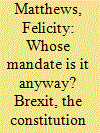

|
|
|
|
|
| Summary/Abstract |
Over the past year, a seemingly relentless barrage of Brexit-related challenges has besieged the British constitution, which together have called into question the legitimacy of the political system. Yet, although it is tempting to regard the decision to hold a referendum on Britain's membership of the European Union as precipitating an acute constitutional crisis, this article argues that political and democratic dilemmas arising from Brexit are symptomatic of a wider constitutional malaise, the roots of which extend far beyond 23 June 2016. Flowing out of this, the article contends that the current crisis is one of ‘constitutional myopia’, fuelled by decades of incoherent reforms and a failure to address adequately democratic disengagement; and that the EU referendum and its aftermath have merely exposed the extent to which the foundations of the constitution have been eviscerated.
|
|
|
|
|
|
|
|
|
|
|
|
|
|
|
|
|
|
|
|
|